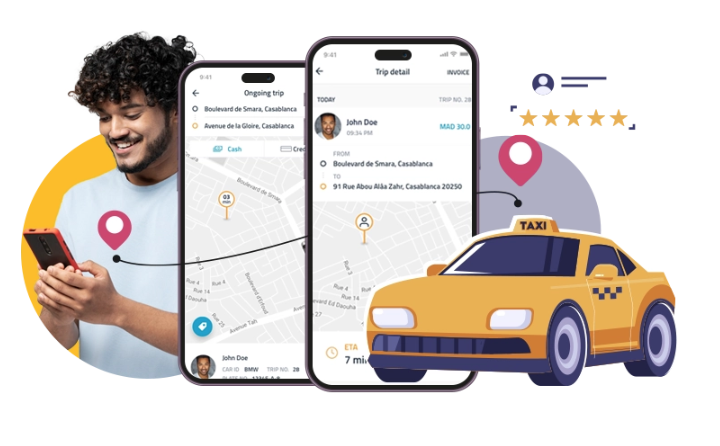In the fast-paced world of transportation, a revolution is underway. Traditional taxi services are gradually being pushed to the sidelines as innovative technology takes center stage. The emergence of the Uber clone app has ushered in a new era of ride-sharing that promises convenience, affordability, and sustainability. In this article, we will delve into the exciting developments in the ride-sharing industry and explore how these clone apps are shaping the future of transportation.
The Rise of Ride-Sharing Giants
Uber: The Pioneer
Uber, founded in 2009, was the trailblazer that transformed the way people hail rides. Its user-friendly app, coupled with cashless transactions and ride tracking, set the standard for ride-sharing services worldwide. Uber’s success sparked the idea of creating Uber clone apps, which seek to emulate its user-centric model.
Lyft: The Friendly Competitor
Lyft joined the fray shortly after Uber, offering a more community-oriented approach. While similar to Uber, Lyft distinguished itself by promoting a friendly, welcoming atmosphere among drivers and passengers. This marked the beginning of healthy competition in the ride-sharing sector.
The Birth of Uber Clone Apps
What Are Uber Clone Apps?
Uber clone apps are essentially replicas of the Uber platform, tailored for entrepreneurs looking to enter the ride-sharing market. These apps offer customizable features, allowing businesses to launch their own branded ride-sharing services quickly.
Why the Clone Approach?
The success of Uber inspired many entrepreneurs to create their own ride-sharing apps, and for good reason. The clone approach eliminates the need for building a ride-sharing platform from scratch, saving time and resources.
The Impact of Uber Clone Apps
- Wider Accessibility
One of the most significant impacts of Uber clone apps is the wider accessibility they provide. Smaller cities and regions that were once underserved by traditional taxi services can now enjoy efficient ride-sharing options.
- Enhanced User Experience
Uber clone apps focus on replicating the seamless user experience that made Uber famous. This includes features such as real-time tracking, transparent pricing, and user reviews, all contributing to a superior ride-sharing experience.
- Job Creation
As the ride-sharing industry expands through these clone apps, job opportunities for drivers and support staff increase. This is especially crucial in times of economic uncertainty, providing flexible earning options for many.
Also Read: Key Features to Consider When Developing an Uber Clone App
Challenges and Controversies
- Regulatory Challenges
The disruptive nature of Uber clone apps has led to regulatory challenges in some regions. Authorities grapple with how to regulate these services, which often fall into a legal gray area.
- Labor Concerns
The gig economy nature of ride-sharing has raised concerns about the labor rights of drivers. Many argue for better protections and benefits for those who rely on ride-sharing as their primary source of income.
The Green Revolution
- Sustainability Efforts
In recent years, ride-sharing companies, including those using clone apps, have made efforts to reduce their environmental footprint. This includes promoting electric vehicles and encouraging shared rides to reduce emissions.
The Road Ahead
- Technological Advancements
The future of ride-sharing lies in continued technological advancements. This includes the development of autonomous vehicles, which could further disrupt the industry by reducing labor costs.
- Market Expansion
As Uber clone apps continue to proliferate, the global reach of ride-sharing is set to expand even further. New markets will open up, offering opportunities for growth and innovation.
Conclusion
The future of ride-sharing is undoubtedly exciting, with Uber clone apps playing a pivotal role in reshaping the industry. As these apps continue to evolve and expand, the way we think about transportation will change forever. Embracing technology and sustainability, ride-sharing is well on its way to becoming an integral part of our daily lives.
Also Read: How To Promote A Multivendor Marketplace?
FAQs
- Are Uber clone apps legal?
Uber clone apps operate in a legal gray area in some regions. Regulations vary, so it’s essential to research your local laws.
- How do Uber clone apps differ from the original Uber app?
Uber clone apps replicate the Uber model but offer customization options for businesses. They allow entrepreneurs to launch their branded ride-sharing services.
- What benefits do Uber clone apps bring to smaller cities?
Uber clone apps provide smaller cities with access to efficient ride-sharing services, filling the gap left by traditional taxis.
- What’s the future of ride-sharing in terms of sustainability?
Ride-sharing companies, including those using clone apps, are focusing on sustainability by promoting electric vehicles and shared rides.
- How will autonomous vehicles affect the ride-sharing industry?
Autonomous vehicles have the potential to reduce labor costs and further disrupt the ride-sharing industry, but their widespread adoption is still in the future.

